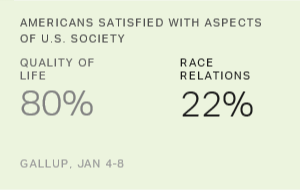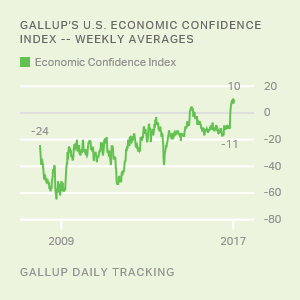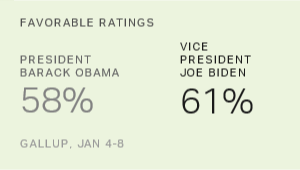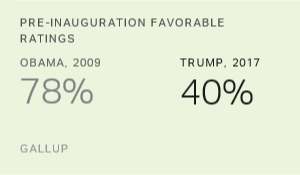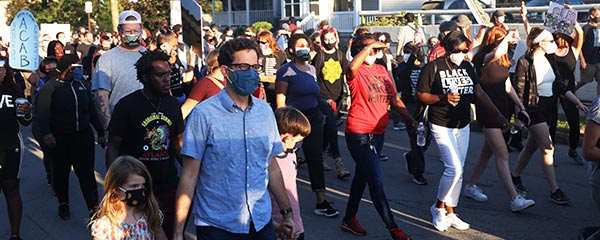Story Highlights
- Americans most satisfied with overall quality of life (80%)
- Least satisfied with race relations (22%), anti-poverty efforts (23%)
- Democrats more satisfied than Republicans on most issues
WASHINGTON, D.C. -- As the nation prepares to transition to Donald Trump's administration, solid majorities of Americans are satisfied with the U.S. quality of life, the opportunity to get ahead by working hard and the nation's military strength. They are much less satisfied with the state of race relations, the nation's efforts to address poverty, and the moral and ethical climate.
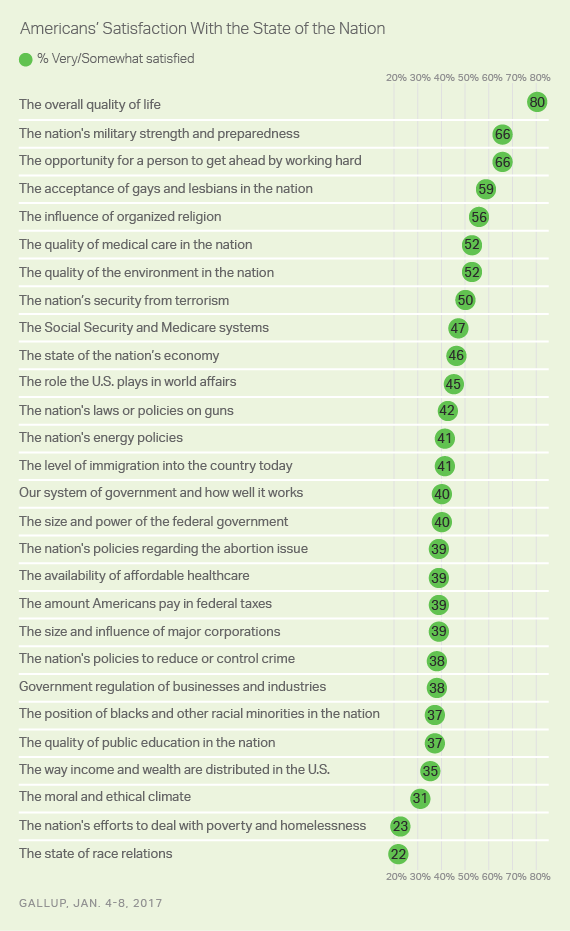
These results are based on Gallup's Jan. 4-8 Mood of the Nation survey, conducted annually since 2001 except for 2009-2011. The survey asks Americans whether they are satisfied or dissatisfied with the state of the nation in a variety of life aspects and policy areas. In forthcoming articles, Gallup will detail some of the notable changes in satisfaction among these 28 items.
As Trump prepares to take the presidential oath on Jan. 20, 80% of Americans are satisfied with the overall quality of life, making it the top area of satisfaction. Quality of life has ranked as the top item each year, tying with military strength and preparedness in 2013 and 2014. Since 2001, about eight in 10 Americans -- with a high of 89% in 2001 and 2002 -- have been satisfied with the overall quality of life in the U.S.
Military strength and the opportunity to get ahead by working hard tie for second this year, with 66% satisfied. These two areas have also engendered relatively high levels of satisfaction in the past, but the percentage satisfied has varied on each. Satisfaction with the opportunity to get ahead fell after the recession to the mid-50% range but is now back to 66%, essentially matching its historical average of 65%. Satisfaction with the nation's military strength and preparedness is currently slightly below its average of 70%.
At least half of Americans are also satisfied with the acceptance of gays and lesbians in the nation (59%), the influence of organized religion (56%), the quality of medical care (52%), the quality of the environment (52%) and the nation's security from terrorism (50%). The acceptance of gays and lesbians ranked near the bottom of the satisfaction list in the decade of the 2000s, but as gays and lesbians have made major gains in civil rights and tolerance toward them has grown, it now ranks near the top of the list.
Forty-six percent of Americans are currently satisfied with the state of the nation's economy, which is the highest level of satisfaction for this item since 2007 (52%). It is also substantially higher than in 2012, when only 13% were satisfied -- the lowest level Gallup has measured for any item since 2001. As previously noted, Gallup did not ask the satisfaction question from 2009 through 2011, and it is possible satisfaction with the economy could have been lower in those years, just after the financial crisis and during periods of high unemployment.
Americans Least Satisfied With Race Relations, Anti-Poverty Efforts
This year, just 22% say they are satisfied with the state of race relations, putting it at the bottom of the list along with the nation's efforts to deal with poverty and homelessness (23%). Anti-poverty efforts have always ranked near the bottom of the list. Race relations had ranked higher in the past, including a tie for fourth place in 2014, before a series of deadly incidents between police and young black men changed perceptions.
Americans are also largely dissatisfied with the moral and ethical climate of the nation, as 31% currently express satisfaction with this aspect of U.S. life. It usually ranks near the bottom in satisfaction, but the percentage satisfied has been lower on average during the Barack Obama years (32%) than it was when George W. Bush was president (38%).
Less than four in 10 Americans are currently satisfied with each of the following: the way income and wealth are distributed (35%), the quality of public education (37%), the position of blacks and other minorities (37%), government regulation of businesses and industries (38%), the nation's policies to reduce or control crime (38%), the size and influence of major corporations (39%), the amount Americans pay in federal taxes (39%), the availability of affordable healthcare (39%) and the nation's abortion policies (39%).
Democrats Tend to Be More Satisfied Than Republicans
Generally speaking, the areas of highest satisfaction are those in which members of the three major political groups express similar levels of satisfaction. For example, 83% of Democrats, 82% of independents and 75% of Republicans are satisfied with the overall quality of life. Majorities of all party groups are satisfied with the opportunity for a person to get ahead by working hard and the acceptance of gays and lesbians. At least half of all three groups are satisfied with the quality of medical care in the U.S.
Democrats are more satisfied than Republicans on most issues, consistent with their more positive views of national conditions in general, likely because a Democratic president is in the White House. Across the 28 items tested, Democratic satisfaction is seven percentage points higher, on average, than Republican satisfaction.
The greatest party difference exists on satisfaction with the level of immigration, with 65% of Democrats and only 19% of Republicans satisfied. Democrats are also much more satisfied than Republicans with military strength and preparedness, the size and power of the government, the state of the economy, and the availability of affordable healthcare.
Republicans are much more satisfied than Democrats with the nation's gun laws, the size and influence of major corporations, the way income and wealth are distributed, and the influence of organized religion.
| Democrats | Independents | Republicans | Dem-Rep Gap | ||||||||||||||||||||||||||||||||||||||||||||||||||||||||||||||||||||||||||||||||||||||||||||||||
| % | % | % | pct. pts. | ||||||||||||||||||||||||||||||||||||||||||||||||||||||||||||||||||||||||||||||||||||||||||||||||
| Level of immigration | 65 | 40 | 19 | +46 | |||||||||||||||||||||||||||||||||||||||||||||||||||||||||||||||||||||||||||||||||||||||||||||||
| Military strength and preparedness | 80 | 73 | 41 | +39 | |||||||||||||||||||||||||||||||||||||||||||||||||||||||||||||||||||||||||||||||||||||||||||||||
| Size and power of federal gov't | 59 | 40 | 21 | +38 | |||||||||||||||||||||||||||||||||||||||||||||||||||||||||||||||||||||||||||||||||||||||||||||||
| State of the economy | 62 | 48 | 28 | +34 | |||||||||||||||||||||||||||||||||||||||||||||||||||||||||||||||||||||||||||||||||||||||||||||||
| Availability of affordable healthcare | 54 | 39 | 24 | +30 | |||||||||||||||||||||||||||||||||||||||||||||||||||||||||||||||||||||||||||||||||||||||||||||||
| Security from terrorism | 63 | 53 | 34 | +29 | |||||||||||||||||||||||||||||||||||||||||||||||||||||||||||||||||||||||||||||||||||||||||||||||
| Role U.S. plays in world affairs | 57 | 45 | 32 | +25 | |||||||||||||||||||||||||||||||||||||||||||||||||||||||||||||||||||||||||||||||||||||||||||||||
| Amount Americans pay in federal taxes | 51 | 36 | 29 | +22 | |||||||||||||||||||||||||||||||||||||||||||||||||||||||||||||||||||||||||||||||||||||||||||||||
| Social Security and Medicare systems | 59 | 46 | 37 | +22 | |||||||||||||||||||||||||||||||||||||||||||||||||||||||||||||||||||||||||||||||||||||||||||||||
| Abortion policies | 47 | 43 | 27 | +20 | |||||||||||||||||||||||||||||||||||||||||||||||||||||||||||||||||||||||||||||||||||||||||||||||
| Gov't regulation of businesses, industries | 44 | 40 | 26 | +18 | |||||||||||||||||||||||||||||||||||||||||||||||||||||||||||||||||||||||||||||||||||||||||||||||
| Energy policies | 49 | 42 | 32 | +17 | |||||||||||||||||||||||||||||||||||||||||||||||||||||||||||||||||||||||||||||||||||||||||||||||
| Moral and ethical climate | 35 | 33 | 21 | +14 | |||||||||||||||||||||||||||||||||||||||||||||||||||||||||||||||||||||||||||||||||||||||||||||||
| Policies to reduce crime | 44 | 37 | 32 | +12 | |||||||||||||||||||||||||||||||||||||||||||||||||||||||||||||||||||||||||||||||||||||||||||||||
| Overall quality of life | 83 | 82 | 75 | +8 | |||||||||||||||||||||||||||||||||||||||||||||||||||||||||||||||||||||||||||||||||||||||||||||||
| Acceptance of gays and lesbians | 62 | 60 | 56 | +6 | |||||||||||||||||||||||||||||||||||||||||||||||||||||||||||||||||||||||||||||||||||||||||||||||
| Quality of medical care | 54 | 54 | 50 | +4 | |||||||||||||||||||||||||||||||||||||||||||||||||||||||||||||||||||||||||||||||||||||||||||||||
| System of government | 41 | 39 | 37 | +4 | |||||||||||||||||||||||||||||||||||||||||||||||||||||||||||||||||||||||||||||||||||||||||||||||
| Quality of public education | 37 | 36 | 33 | +4 | |||||||||||||||||||||||||||||||||||||||||||||||||||||||||||||||||||||||||||||||||||||||||||||||
| State of race relations | 21 | 22 | 22 | -1 | |||||||||||||||||||||||||||||||||||||||||||||||||||||||||||||||||||||||||||||||||||||||||||||||
| Efforts to deal with poverty, homelessness | 16 | 22 | 27 | -11 | |||||||||||||||||||||||||||||||||||||||||||||||||||||||||||||||||||||||||||||||||||||||||||||||
| Opportunity to get ahead | 56 | 64 | 75 | -19 | |||||||||||||||||||||||||||||||||||||||||||||||||||||||||||||||||||||||||||||||||||||||||||||||
| Quality of the environment | 45 | 50 | 64 | -19 | |||||||||||||||||||||||||||||||||||||||||||||||||||||||||||||||||||||||||||||||||||||||||||||||
| Position of blacks, racial minorities | 26 | 39 | 45 | -19 | |||||||||||||||||||||||||||||||||||||||||||||||||||||||||||||||||||||||||||||||||||||||||||||||
| Influence of organized religion | 43 | 56 | 65 | -22 | |||||||||||||||||||||||||||||||||||||||||||||||||||||||||||||||||||||||||||||||||||||||||||||||
| Way income and wealth are distributed | 19 | 34 | 48 | -29 | |||||||||||||||||||||||||||||||||||||||||||||||||||||||||||||||||||||||||||||||||||||||||||||||
| Size and influence of major corporations | 24 | 38 | 54 | -30 | |||||||||||||||||||||||||||||||||||||||||||||||||||||||||||||||||||||||||||||||||||||||||||||||
| Gun laws | 18 | 44 | 57 | -39 | |||||||||||||||||||||||||||||||||||||||||||||||||||||||||||||||||||||||||||||||||||||||||||||||
| Gallup, Jan. 4-8, 2017 | |||||||||||||||||||||||||||||||||||||||||||||||||||||||||||||||||||||||||||||||||||||||||||||||||||
Implications
Americans, including those of different political affiliations, are widely satisfied with the overall quality of life in the U.S. This has consistently been the No. 1 item on Gallup's broad satisfaction list across the 14 years Gallup has asked the question, spanning the end of Bill Clinton's administration and the entire George W. Bush and Obama administrations.
Over those years, Americans also have been largely satisfied with the opportunity to get ahead by working hard, as well as the nation's military strength and preparedness. They have been consistently dissatisfied with U.S. efforts to deal with poverty and homelessness and with the moral and ethical climate in the country. In those areas, the country that Trump is preparing to oversee is similar to the one his predecessors governed.
One area where the U.S. is much different now than in the past is in its high level of dissatisfaction with the state of race relations. Americans' hopes that Obama would improve race relations were largely unmet, in large part because of the many high-profile, deadly incidents involving blacks and whites that occurred in recent years and sparked the Black Lives Matter movement. Trump, whose campaign rhetoric antagonized many racial and ethnic minorities, faces a significant challenge in trying to address the black community's concerns about law enforcement and ultimately heal racial divisions in the country.
Historical data are available in Gallup Analytics.
Survey Methods
Results for this Gallup poll are based on telephone interviews conducted Jan. 4-8, 2017, with a random sample of 1,032 adults, aged 18 and older, living in all 50 U.S. states and the District of Columbia. For results based on the total sample of national adults, the margin of sampling error is ±4 percentage points at the 95% confidence level. All reported margins of sampling error include computed design effects for weighting.
Each sample of national adults includes a minimum quota of 70% cellphone respondents and 30% landline respondents, with additional minimum quotas by time zone within region. Landline and cellular telephone numbers are selected using random-digit-dial methods.
Learn more about how the Gallup Poll Social Series works.
